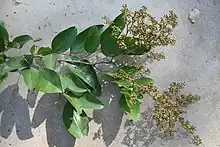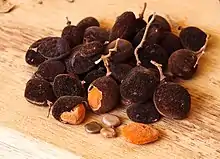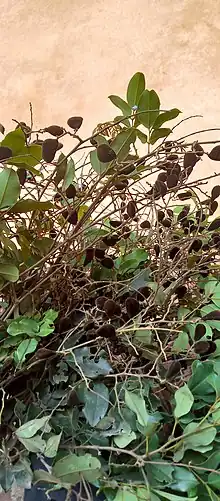Dialium guineense
Dialium guineense, the velvet tamarind, is a tall, tropical, fruit-bearing tree in the flowering plant family Fabaceae. It has small, typically grape-sized, edible fruits with brown, hard, inedible shells.
| Dialium guineense | |
|---|---|
 | |
| Scientific classification | |
| Kingdom: | Plantae |
| Clade: | Tracheophytes |
| Clade: | Angiosperms |
| Clade: | Eudicots |
| Clade: | Rosids |
| Order: | Fabales |
| Family: | Fabaceae |
| Genus: | Dialium |
| Species: | D. guineense |
| Binomial name | |
| Dialium guineense | |
Distribution
It grows in dense forests in Africa along the southern edge of the Sahel. In Togo it is called atchethewh.
The velvet tamarind can be found in West African countries such as Benin where it is called "Assiswè", Ghana where it is known as Yoyi, Sierra Leone where it is known as “black tombla”, Senegal, Guinea-Bissau where because of its texture is called "Veludo", Portuguese for velvet, and Nigeria where it is known as awin or igbaru in Yoruba,[2] icheku in Igbo and tsamiyar biri in Hausa.
Uses
The bark and leaves have medicinal properties and are used against several diseases.

Fruit
Each fruit typically has one hard, flat, round, brown seed, typically 7-8 millimeters across and 3 millimeters thick. The seed somewhat resembles a watermelon seed (Citrullus lanatus). Some have two seeds. The seeds are shiny, coated with a thin layer of starch.
The pulp is edible and may be eaten raw or soaked in water and consumed as a beverage. The bitter leaves are ingredients in a Ghanaian dish called domoda.

Timber
Wood is hard and heavy and used for construction. The wood is also used for firewood and charcoal production
References
- IUCN SSC Global Tree Specialist Group & Botanic Gardens Conservation International (BGCI) (2022). "Dialium guineense". IUCN Red List of Threatened Species. 2022: e.T204813231A204813233. Retrieved 16 January 2023.
- Bascom, William R. (Jan 1951). "Yoruba Food". Africa. Cambridge University Press. 20 (1): 47. doi:10.2307/1156157. JSTOR 1156157. S2CID 149837516.
External links
- World Agroforestry
- Dressler, S.; Schmidt, M. & Zizka, G. (2014). "Dialium guineense". African plants – a Photo Guide. Frankfurt/Main: Forschungsinstitut Senckenberg.
 Media related to Dialium guineense at Wikimedia Commons
Media related to Dialium guineense at Wikimedia Commons Data related to Dialium guineense at Wikispecies
Data related to Dialium guineense at Wikispecies
